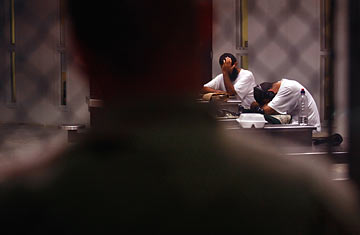
A U.S. military guard watches over detainees on Guantánamo Bay
In a move that will put Britain's relationship with U.S. intelligence agencies under intense and possibly damaging scrutiny, British Prime Minister David Cameron has launched an unprecedented inquiry into whether security services were involved in the torture of terrorism suspects.
Cameron on Tuesday ended months of speculation and addressed the demands of civil-liberties groups by announcing the judge-led, largely closed investigation into claims that have dogged the country's security services since Sept. 11 — specifically that British agents colluded with operatives of other countries, including the U.S., in the torture of terrorism suspects.
Cameron's announcement comes just two weeks before he is set to travel to Washington for his first major face-to-face meeting as Prime Minister with U.S. President Barack Obama. Cameron told Parliament on Tuesday that the inquiry would be designed to get at the truth and answer public concerns over the treatment of suspects without compromising security officers or operations, or harming Britain's intelligence-sharing relationship with the U.S. — something former Foreign Secretary David Miliband warned against.
About a dozen criminal and civil cases are under way into the allegations, which range from suggestions that British security services colluded in torture by others to accusations that British agents carried out such abuses themselves — something Cameron during his announcement insisted there is no evidence to support. Other cases center on the practice of extraordinary rendition: it has been alleged that U.S. security services moved suspects to other countries for torture, sometimes stopping off in the U.K. to refuel.
There will now be attempts to settle the civil cases — which have been brought privately, rather than by police — possibly with victims being offered compensation, in an effort to allow the inquiry to start this year and be completed within 12 months. As yet, there is no indication of what action may follow the inquiry if wrongdoing is uncovered.
Probably the most prominent case is that of Binyam Mohamed, a British resident who was held at Guantánamo Bay from 2004 until last year. He was first arrested in Pakistan in 2002 and was handed over to the Americans, who moved him to Morocco and then Afghanistan, before finally detaining him at Guantánamo. Mohamed claims he was tortured in Pakistan under the supervision of U.S. agents and after being "rendered" to Morocco, where he alleges Britain's MI5 fed questions to his Moroccan interrogators via the CIA. He says the abuse he suffered included beatings, scaldings and having his penis slashed.
Mohamed was freed from Guantánamo last year after the charges of his involvement in terrorist plots were dropped. He has always insisted that the evidence against him was falsely obtained under torture.
During legal proceedings in 2008, the British High Court ruled that the Foreign Office should release any records of Mohamed's alleged abuse to his legal team to aid his defense but stopped short of saying they should be made public after being told that Miliband believed such a move would harm Britain's special intelligence relationship with the U.S.
Speaking to the BBC last August, Sir John Scarlett, then head of the foreign security service, MI6, denied that there had been any torture of suspects or collusion by British agents. "Our officers are as committed to the ... human-rights values of liberal democracy as anybody else," he said. Several ministers from the Labour Party, which was in power at the time, also insisted that the U.K. did not use or condone torture.
But in February this year, the British Court of Appeal ordered the Foreign Office to publish seven paragraphs of information about Mohamed's treatment in Pakistan, which had previously been censored from court papers. The judgment concluded that Mohamed had been subjected to "cruel, inhuman and degrading treatment by the United States authorities."
The investigation announced by Cameron on Tuesday will revisit all these issues. In launching the inquiry, the Prime Minister has attempted to walk a difficult line between getting to the truth and not undermining the continuing work of the security services or jeopardizing future intelligence cooperation with other nations' services, notably that of the U.S.
So far, he appears to have won support from across the political spectrum in the U.K. It remains to be seen whether that support will extend to other countries, and whether it will survive the outcome of the inquiry.
